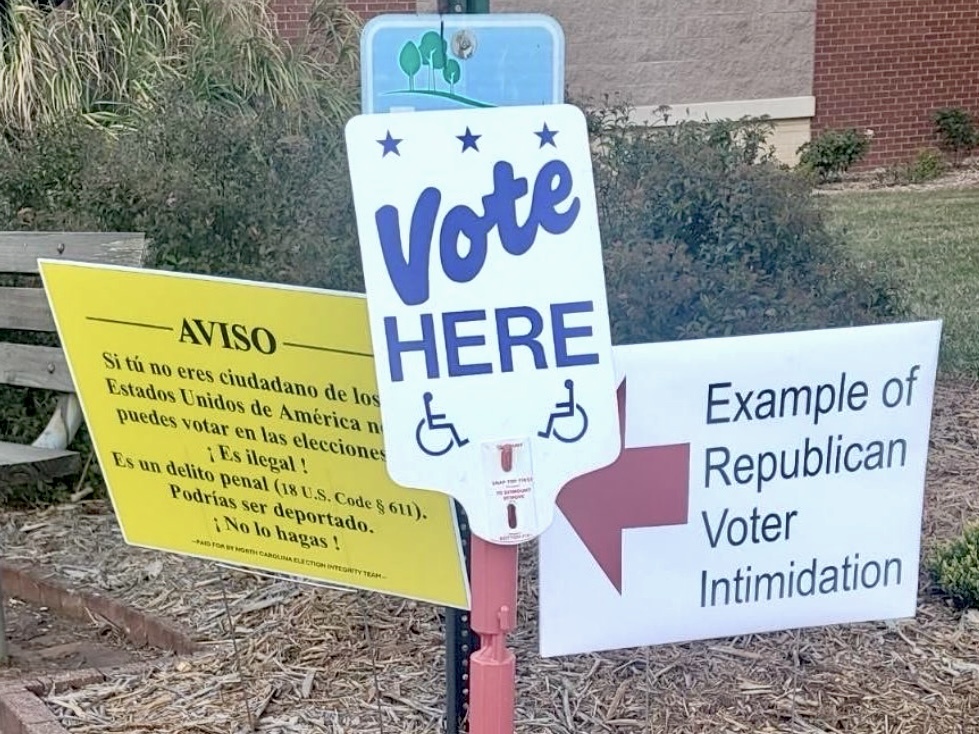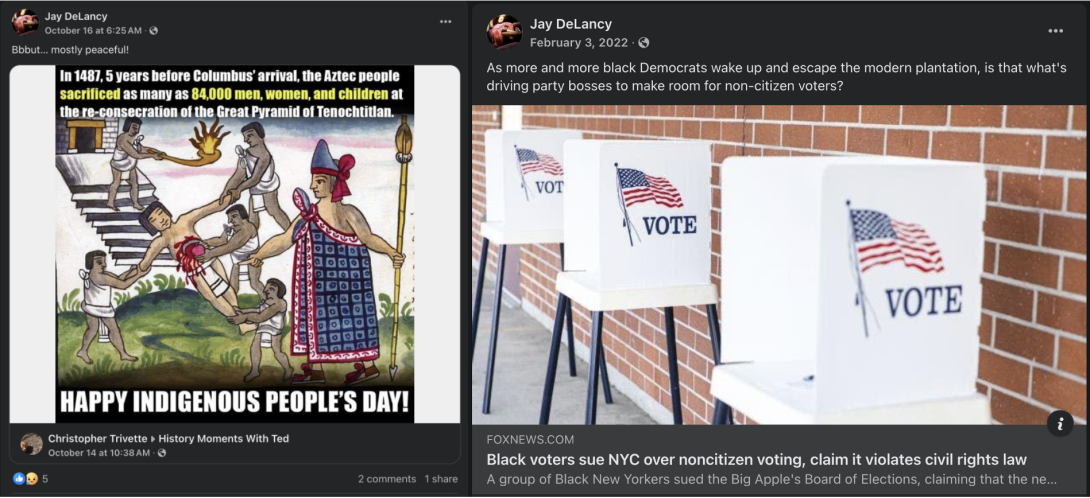N.C. election officials, GOP leaders revealed to have close ties to key election denial group

Spanish-language N.C. Election Integrity Team (NCEIT) sign in yellow at a polling site in Mecklenburg County, N.C., warning noncitizens about voting.
Since the 2020 presidential elections, perhaps no individual has done more to promote the Big Lie that former President Donald Trump was wrongfully denied reelection due to supposed fraud than one of his election lawyers, Cleta Mitchell.
As the presidential election was being decided, Mitchell helped lead Trump’s legal strategy to overturn the election results based on false claims of widespread fraud. And soon after the election was decided, the former Oklahoma legislator went on to form the Election Integrity Network (EIN), which has trained people and groups who draw on conspiracy theories and disinformation to promote restrictions on voting and sow doubt about the legitimacy of elections across the country.
Today, in her adopted home state of North Carolina, Mitchell's dream of creating an “army of citizens” to promote election denial is at least partially coming to fruition — and includes election officials and key leaders of the Republican Party.
Documents and recordings obtained by Facing South show that at least 13 members of county election boards in North Carolina, 25 county leaders of the Republican Party, and a GOP Council of State official are members or active participants in the N.C. Election Integrity Team (NCEIT), the state affiliate of Mitchell’s Election Integrity Network.
The involvement of local officials who are administering North Carolina’s elections in NCEIT, as well as the role of key GOP leaders, demonstrate the extent to which Mitchell and others have succeeded in mainstreaming election denialism. They also raise questions about the extent to which these local leaders will deploy false claims of fraud — which Trump has repeated on the campaign trail in recent weeks — to undermine the 2024 election results.
Roots of North Carolina denialism
Jim Womack, the chair of the Republican Party in Lee County, N.C., created NCEIT in 2022 and is the group’s most visible leader. An Army veteran and former IT executive, Womack was a county commissioner from 2010 to 2014 and has made several unsuccessful runs for chair of the N.C. GOP. He insists he’s not a “conspiracy theorist,” but believes the 2020 election was a “train wreck,” and calls Mitchell his “mentor.”
Womack was brought into the national spotlight in October when video surfaced of him saying that newly registered voters with “Hispanic-sounding last names” should be flagged as “suspicious” and targeted for potential voter challenges.
One of NCEIT’s other chief leaders is Jay DeLancy, a former Air Force officer with a long history of promoting false election narratives in North Carolina. In 2012, DeLancy founded the Voter Integrity Project after the organization he previously worked with, True the Vote, “raised concerns about his anti-immigrant leanings”. DeLancy was known for repeatedly challenging the registrations of voters — largely people of color — for allegedly being noncitizens, claims that were rarely verified after analysis by election officials.
DeLancy’s attachment to xenophobic rhetoric hasn’t waned: His self-published book released this fall, Aliens Among Us, details his efforts at exposing "how non-U.S. citizens have infiltrated America's electoral process." He also supports North Carolina's proposed “Citizens Only” constitutional amendment, which would change the definition of eligible voters from “every person born in the United States and every person who has been naturalized” who is 18 or over to “only U.S. citizens.”
DeLancy has written that he supports the amendment on the basis that it would prevent “birther babies” from voting if Congress ends birthright citizenship. DeLancy also states that “black Democrats” are on a “modern plantation” and has shared social media posts implying that Indigenous people are uniquely violent and bloodthirsty.

In line with these anti-immigrant views, NCEIT has placed more than 500 signs across the state threatening noncitizens who attempt to vote with deportation — signs which voting rights advocacy groups argue amount to unlawful voter intimidation. NCEIT is also a member of the Only Citizens Vote coalition, which was also founded by former Trump lawyer Cleta Mitchell, and held a press conference in April supporting the “Citizens Only” constitutional amendment.
DeLancy’s involvement in NCEIT points to the long lineage of election denialism in North Carolina nurtured by Republican and conservative leaders. Although they have largely distanced themselves from him now, prominent think tanks supported by GOP benefactor Art Pope gave a platform to DeLancy’s false claims of election fraud more than a decade ago. In 2016, Republican Governor Pat McCrory’s campaign made hundreds of false claims of voter fraud to cast doubt on that year’s gubernatorial contest, leading to defamation lawsuits from wrongfully accused voters that were only closed last year.
And after the 2020 elections, one of the key Republican leaders making false claims about the outcome of the presidential race was North Carolina’s GOP chairman, Michael Whatley, who led “Stop the Steal” rallies across the state. Earlier this year, Whatley was Trump’s pick to serve as co-chair of the Republican National Committee, a position he now holds.
NCEITers in key places
While much of NCEIT’s efforts to influence voting and elections happens behind closed doors, organizational documents and recordings of NCEIT meetings obtained by Facing South show that they have succeeded in recruiting key local leaders to their cause — raising sharp concerns about the role they will play in the state’s 2024 elections.
Material collected by Facing South finds that at least 13 members of county election boards in North Carolina, 25 county Republican Party leaders, and one member of the Council of State have been actively involved in NCEIT, and in some cases, are official local contacts for the organization.
CHART: North Carolina election officials and GOP leaders active in NCEIT
In coastal New Hanover county — home of Wilmington and the 11th-largest county in the state — county board of elections member Bruce Kemp frequently joins NCEIT’s weekly meetings, and often looks to NCEIT leaders for advice about elections administration. On an NCEIT call before the March 2024 primary, Kemp asked how to handle cases in which people appointed as early voting officials also wanted to conduct partisan activities, like door knocking. After being told by Womack that the N.C. State Board of Elections was allowed to restrict this activity, Kemp is recorded as saying, “I'm going to suggest to some folks privately that until they're caught they can do what they want to do as long as they feel like they can swear the oath fairly.”
James F. Davis, a Board of Elections member in Clay County in western North Carolina, is also a regular at NCEIT meetings. At an August 2024 meeting, Davis reported that he had encouraged Clay County’s Board of Elections Director to make changes to the voter rolls based on information from Carol Snow, an NCEIT ally and founder of NC Audit Force, a right-wing group of “citizen volunteer canvassers.” Davis is further documented as claiming that the director had removed half of the names submitted by Snow.
Dale Folwell, North Carolina’s state treasurer, is also a regular attendee of the weekly NCEIT call, and is often given time at the end of these NCEIT meetings to thank Jim Womack and praise the work that NCEIT is doing.
Herschel Johnson, vice chair of the Transylvania County Republican Party and NCEIT’s Translyvania County coordinator, has been NCEIT’s point person for its adoption of Eagle AI, a troubled voter database created to generate and submit mass voter challenges. When Eagle AI failed to function properly in North Carolina, Johnson was tasked with giving increasingly disappointing weekly updates to NCEIT members.
Second Vice Chair of the Guilford County GOP Deanna De’Liberto is a fixture at NCEIT meetings and the NCEIT county coordinator for Guilford. At an August 2023 meeting, during a discussion of NCEIT’s legislative priorities, De’Liberto bemoaned Democratic influence in the county and speculated about passing legislation preventing those who do not pay taxes in a jurisdiction from voting there. In a recording obtained by Facing South, De’Liberto said, “We've got a lot of people voting that don't really, they don't have any skin in the game. They don't pay taxes, you know, and I was hoping to see that in a bill that we could limit that.”
She later expanded on this, saying, “I'm just very concerned about Guilford County and we're becoming bluer and bluer and and a lot of this has to do with, you know, the liberal college campuses that are indoctrinating students and and we just don't think that they should be voting. I mean, you know, in our county, because they don't, they don't pay taxes here.”
Moving the NCEIT agenda
There is evidence that NCEIT has succeeded in leveraging its members and connections to shape state elections policy. For example, a key 2023 elections bill passed in N.C., Senate Bill 747, contained numerous specific provisions that aligned neatly with NCEIT's legislative priorities. While legislative leaders denied NCEIT’s influence, records show that that Cleta Mitchell and Jim Womack met with leadership just days before the bill was made public. For its part, NCEIT claimed credit for the passage of SB 747 in a 2023 list of accomplishments.
That wasn’t enough for Jim Womack, who was dissatisfied that the General Assembly failed to implement other pieces of NCEIT’s agenda, including proposals to close North Carolina’s open primaries or allow public broad access to cast vote records. A recording obtained by Facing South of an August 2023 NCEIT meeting reveals Womack, in a fit of pique, threatening to use his position as Lee County GOP chair to advocate for all county Republican parties to cut off fundraising to the state House and Senate Republican caucuses.
NCEIT County Board of Elections members have also been directly involved in furthering the group’s legislative agenda. According to a 2023 internal NCEIT powerpoint, both Republican County Board of Elections members from Henderson County, Linda Rebuck and Deborah Dante, were part of an NCEIT meeting with state Senate members about the future of the Electronic Registration Information Center (ERIC), a cross-state voter list maintenance tool targeted by right-wing lawmakers.
Soon after, Republican leaders in the state Senate voted to heavily restrict ERIC in the state budget, with one senator sharing the good news in an email to NCEIT’s Jim Womack. The NC General Assembly later enacted a total ban on engagement with ERIC.
Ensuring free and fair elections
As Election Day nears, democracy advocates have raised concerns about the role NCEIT and election deniers could play in disrupting the 2024 elections, especially if Trump is not victorious. A report earlier this year from Informing Democracy, a group that compiles information about state and local elections, reviewed 498 county election officials in North Carolina and found 51 instances where their "past behavior raises concerns about their commitment to fair vote counting and election certification." In 2023, North Carolina's state election board was forced to remove two members of the Surry County board of elections due to their refusal to certify the 2022 election results.
A recent report by The Brookings Institution listed six North Carolina counties as either warranting "concern" (Mecklenburg, where Charlotte is based) or being "worth watching" (Burke, Halifax, Montgomery, New Hanover, and Surry) as "worth watching" due to the influence of deniers on their county election boards.
"The nightmare scenario is that they’ll hold up certification. They’ll force state officers to go to court to compel them to certify the results while they spread disinformation about widespread voter fraud and non-citizen voting,” said Arn Pearson, executive director of the Center for Media and Democracy, which issued its own report documenting election denialism among candidates and officials in 2024 swing states, including North Carolina.
North Carolina election officials and voting advocates have taken steps to prevent election deniers from using false information and narratives to sow discord. The N.C. State Board of Elections has proactively distributed information about how the state's voting process works, and on November 2 — the last day of early voting in North Carolina — issued a press release clarifying that all U.S. citizens in the state are eligible to vote.
Advocates in North Carolina and nationally have set up Election Protection hotlines and are organizing teams to assist voters, monitor polling sites for intimidation and other issues, and follow county election boards through the election certification process.
"To me, it seems like they're trying to gather data that they could put together to then create doubt in the election," said Susan Feindel, who serves as chair of the county election board in Lee County, where NCEIT leader Womack is based. "All I want is to have a free and fair election and to be left alone so that we can do our jobs."
Tags
Lekha Shupeck
Lekha Shupeck is Director of Programs at the Institute for Southern Studies, publisher of Facing South, where she helps oversee programs and strategy. Before joining the Institute, Shupeck held leadership positions at Documented, All On the Line, and the ACLU of North Carolina.
Chris Kromm
Chris Kromm is executive director of the Institute for Southern Studies and publisher of the Institute's online magazine, Facing South.

